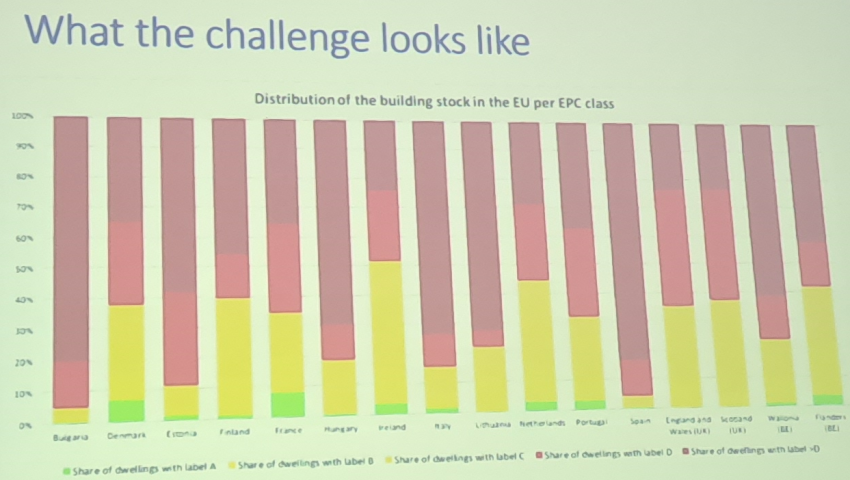Silvia Rezesi, EC: EUR 275 billion investments per year are needed until 2030 to reduce emissions from buildings by 55%

In Bulgaria, most buildings have the worst energy performance, with the highest class currently being B, but very few buildings still meet it.
Photo: Presentation
Raya Lecheva
275 billion euros of investments are needed annually until 2030 to reduce emissions from buildings by 55%, Silvia Rezesi from the Directorate General for Energy in the European Commission announced at a round table "Zero-energy buildings: the future is now" in Burgas, organized by The Energy Efficiency Center EnEffect. Necessary involvement of private investment and the financial sector, because the necessary funds cannot be found in any other way.
The picture throughout the EU is very complex and interesting, and perhaps it will not be surprising that a large number of countries have similar problems with Bulgaria, related to the old housing stock, financing and lack of capacity.
Up to 85% of the building stock will be energy inefficient in 2050
The building stock in the EU represents 24 billion m2 of area and about 74% is residential. About 186 million housing units are permanently occupied. Annually, only 11% of existing buildings undergo some kind of new renovation. The average annual rate of energy renewal is about 1%. Also 85% of existing buildings in the EU were built before 2000. In addition, 75% of buildings are not energy efficient. Even worse, 85% will be energy inefficient in 2050. And the building stock is one of the biggest energy consumers in the EU, responsible for more than a third of the EU's energy-related emissions.
The plans are to at least double the renovation of buildings by 2030 and the average annual renovation rate to be 3%, said Silvia Rezeschi, who is actively involved in the preparation of the directive on the energy performance of buildings.
The new goals are from buildings with close to zero energy consumption to already building buildings with zero emissions. Zero-emission buildings become the level to be reached through deep renovation from 2030 and the vision of the building stock in 2050.
Therefore, an update of climate zones, incentives for on-site energy sources, efficient central heating and energy communities are needed. It is planned to calculate the global warming potential over the entire life cycle of new buildings from 2030, and from 2027 for large buildings. Enhanced requirements for charging e-cars and mandatory bicycle parking in new buildings are being created. More ambitious requirements to remove barriers to remediation.
Member States must remove subsidies for fossil fuel boilers. The new minimum standards for the energy performance of buildings foresee an acceleration of the pace of renovation for the buildings with the worst performance.
For public and non-residential buildings to achieve energy performance standard class F 2027 and class E by 2030.
Residential buildings must reach at least class F by 2030 and class E by 2033.
Bulgaria is at the bottom of the ranking in terms of energy performance of the building stock and we have buildings with the lowest energy class. At the moment, the legislation defines the highest-class B of energy efficiency, while in other European countries they talk about class A and A+ even for buildings with zero emissions.
The EU is considering new classes for the energy performance of buildings. All energy performance certificates must be on a uniform scale from A to G, with A being buildings with zero emissions and G 15% of buildings with the worst energy performance. Indicators for measuring greenhouse gases are being introduced, which will also be important because buildings will enter the emissions trading scheme from 2027, and proving the high energy efficiency of the low-emission building will be done with certificates. In Poland, owners can no longer sell or rent their building without having a renewed energy passport and energy efficiency certificate of their building. The validity of lower-class certificates will be reduced to 5 years to ensure up-to-date information and improved quality. It is very important to introduce intelligent management systems in the buildings, Rezesti also emphasized.
All these measures are part of the transformation of Europe's energy system, and the transposition of the legislation and the implementation of the Energy Performance Directive is not mandatory, but voluntary, but it is extremely important that it happens.
All these new proposals are from the European Commission. From June 6, negotiations on the directive on the energy performance of buildings begin with the Council and the European Parliament before the final document is ready.
